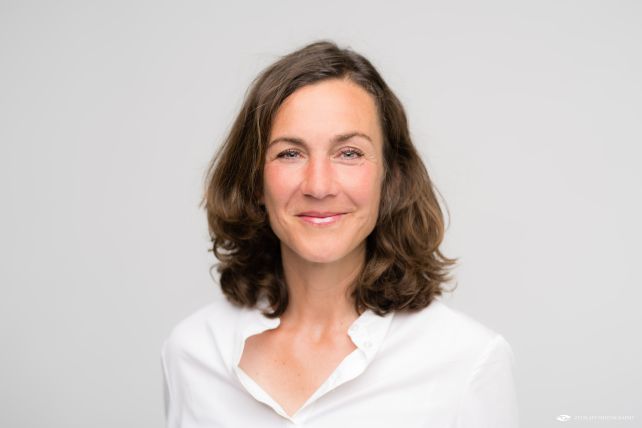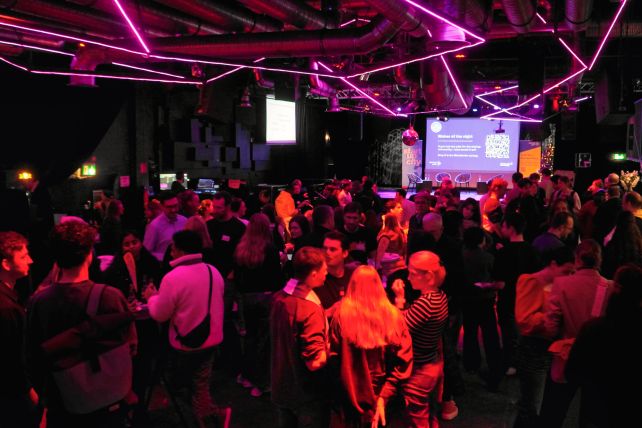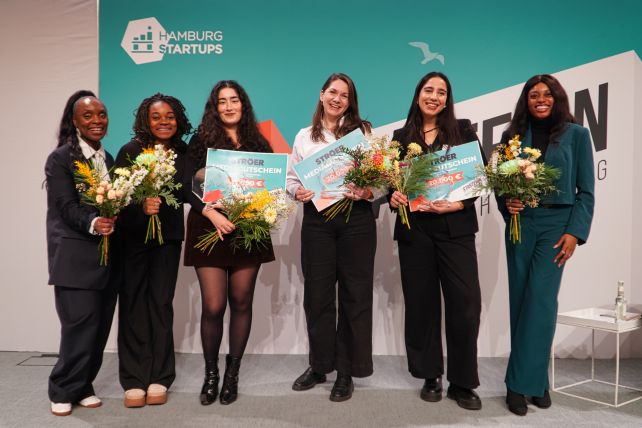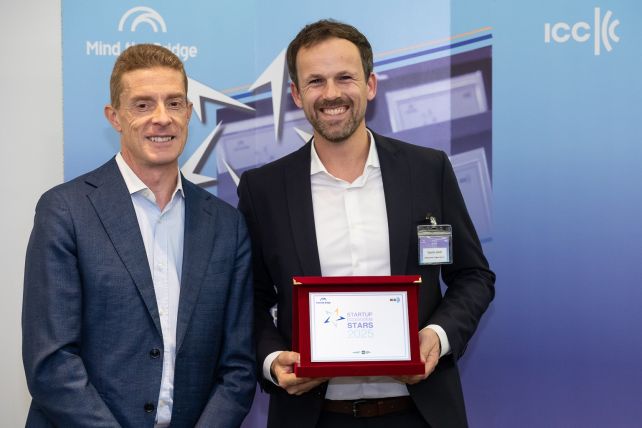Fybra - an Italian startup provides fresh air in Hamburg
It's actually quite simple: ventilation helps with bad air in closed rooms. But to achieve the best possible effect, it's all about the right time, the optimum duration and the right frequency. The Italian startup Fybra has developed a technology to perfect ventilation. Thanks to the Scaleup Landing Pad Hamburg market entry support programme, it has already successfully tested this in schools in Hamburg.

A project becomes a startup
Since 2019, Gaetano Lapenta and Marco Scaramelli were testing a technology to improve air in schools and at the same time avoid the waste of energy related to ventilation. It turned out to be a promising project and they decided to cover the technology with a patent, after extensive measurements in four schools in the region of Milan.
It has long been undisputed that the microclimate in rooms has a significant influence on productivity and well-being. A number of factors play a role in this, which are interrelated in a variety of ways. These include, among others:
Temperature of the room air
Humidity of the room air
Carbon dioxide concentration
Air impurities, odours

Fybra helps with a traffic light when ventilating
The optimum comfort temperature varies from person to person and also depends on gender - for physiological reasons, women prefer it a little warmer. However, a value of around 20° Celsius (in winter season) is generally perceived as cosy. The situation of humidity and CO2 content is simpler. Dry air is more pleasant than humid air and too much carbon dioxide is detrimental to well-being. In the outside air, the proportion is around 0.04 %; in closed rooms, up to 0.08 -0.1 % is considered ideal. Above 0.14 % it becomes critical, and such a result is quickly reached in a classroom where many people are working in a confined space.
Schools are therefore regularly ventilated, but often at the wrong time, too long or too short. The consequences are a room temperature that is too low in winter, which may have to be compensated for by excessive heating costs, and an insufficient improvement in air quality. This is where the startup Fybra, which emerged in 2021 from the project by Gaetano and Marco, comes into play. Gaetano Lapenta is the CEO and Marco Scaramelli is the CTO. Fybra uses IoT sensors to measure air quality and comfort conditions, and analyses in a cloud the results based on one of the world's largest databases on natural ventilation. A traffic light system signals when it is the right time to ventilate and when to stop. If it is red, it is time to open the windows. The ventilation phase is indicated by the colour purple and blue means that the windows should be closed again.

The Scaleup Landing Pad brings Fybra to Hamburg
The principle works in all kinds of buildings, including private homes. The startup has designed its product range accordingly. There is Fybra Home, Fybra Space for offices and Fybra Therm, a thermostatic valve that corresponds with the air measurement system. However, Fybra School takes centre stage, and there are a number of reasons for this. Schools are often located in old buildings with confined spaces, which makes adequate ventilation difficult. It is also important to the startup to provide children with a healthy environment and the opportunity for focused learning. The name itself is a claim: For Young Brains, which turns into Fybra. And finally, families who have had good experiences with the technology are welcome multipliers.
The startup quickly found many advocates and supporters in Italy, with numerous schools using the service on a trial basis and becoming customers. Encouraged by its success and numerous prizes and awards, Fybra soon put out feelers for international markets. Germany was a particularly obvious choice, as the most populous country in the EU and a stepping stone to the countries of Northern Europe. The interest was mutual and the founders received invitations to events. At one of these events in Berlin, Hamburg Invest became aware of Fybra, an institution whose mission includes convincing international companies of Hamburg as a business location. The Scaleup Landing Pad soft landing programme is specially tailored to fast-growing startups.
Elevating Enterprises with International Innovation Partnerships:
The Scaleup Landing Pad Hamburg, an initiative by Hamburg Invest, is dedicated to future-proofing local enterprises by forging partnerships with cutting-edge international GreenTech scaleups. This initiative not only introduces pioneering concepts to local corporations but also accelerates the integration of these young companies into the Hamburg market through strategic pairings with seasoned local businesses.
A successful test run at Hamburg schools
Fybra was tipped off by Hamburg Invest to apply for the programme and made it into the programme in 2023 along with nine other scaleups. Among other services, the Scaleup Landing Pad gives participants access to an extensive business network that serves as a door opener to many industries and sectors. It has also had the desired effect on schools, where there was initially scepticism. However, this was quickly dispelled. Fybra contacted 87 schools in Hamburg, scrutinised 17 more closely and finally included seven in a pilot project.
A total of 61 air measuring devices were connected there, involving around 1,500 pupils. The project started in January 2024 with the first measurements and had its active phase from 12 February to 15 March. The results are impressive. The use of Fybra led to an average reduction in CO2 emissions of 10.42%, with the maximum value even reaching 23.58%. The increase in room temperature was less significant, but still peaked at 8.27%. In addition to the objective improvements, there were also subjective judgements. Both teachers and schoolchildren perceived the air as fresher and the working conditions as more pleasant than before the use of Fybra.

Hamburg as a springboard for Fybra
However, Fybra not only ensures better air, the use of the technology is also linked to a learning programme. Students can view the measurement data on tablets and learn about scientific topics in a fun way. The understanding of Fybra's technology learnt in this way should further increase the willingness to use it. In fact, the pilot project was continued in April and May and there are high hopes that the schools will become long-term customers.
The signalling effect of the project's success extends far beyond Hamburg's borders. This is demonstrated, among other things, by its inclusion in the Wi-Fi Sensing Programme of hubraum, Deutsche Telekom's tech incubator, which was announced at the beginning of May. There are already enquiries from Berlin and southern Germany, and Germany is acting as an export platform all the way to the USA. If the plan works out, the company, which is still headquartered in Milan, will certainly soon expand its current two-person team in Hamburg. The next planned financing round should provide an additional boost. In the first two rounds, Fybra was able to secure a total of around two million euros in equity and grants. The next amount is likely to be significantly larger, not least thanks to the work of the Scaleup Landing Pad.










